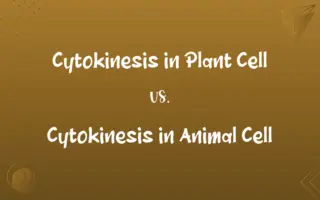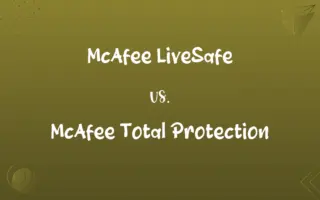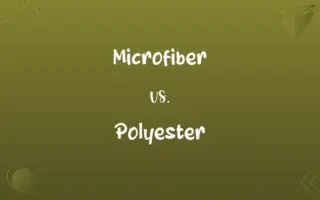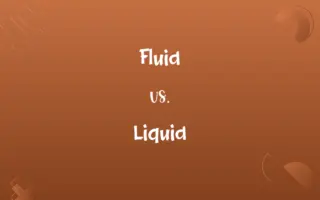Monomer vs. Polymer: Know the Difference

By Shumaila Saeed || Updated on December 25, 2023
A monomer is a single molecule that can bind chemically to other molecules to form a polymer, while a polymer is a large molecule composed of repeating monomeric units.
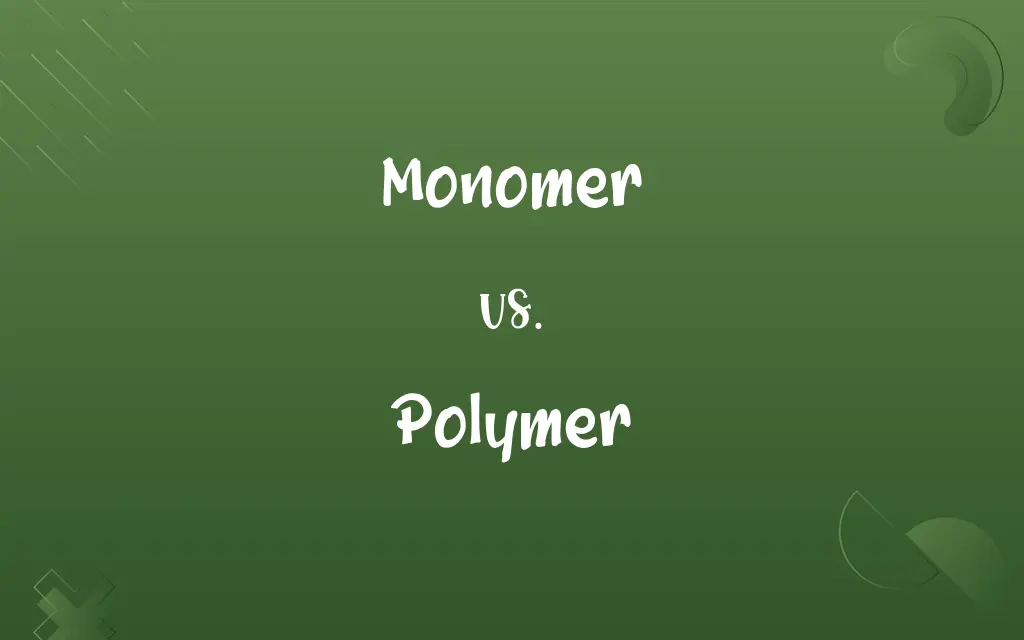
Key Differences
A monomer is a basic building block or a single molecule that can react with other monomer molecules to form a polymer, which is a larger, more complex structure. Polymers consist of repeated units of monomers linked together through chemical bonds.
Shumaila Saeed
Dec 24, 2023
Monomers are typically small and simple in structure, making them the fundamental units for constructing more complex polymer structures. Polymers, on the other hand, can be large and have a wide range of physical and chemical properties, depending on the types and arrangements of monomers they are composed of.
Shumaila Saeed
Dec 24, 2023
In terms of functionality, monomers can react with themselves or other types of monomers to create a variety of polymers. Polymers, due to their diverse and complex nature, find extensive applications in different fields like plastics, textiles, and biotechnology.
Shumaila Saeed
Dec 24, 2023
Monomers often possess reactive groups that allow them to undergo polymerization. Polymers, resulting from this process, can be linear, branched, or cross-linked, depending on how monomers are connected.
Shumaila Saeed
Dec 24, 2023
Examples of monomers include glucose, ethylene, and amino acids, which are the building blocks for polymers like starch, polyethylene, and proteins, respectively. Each polymer's properties and uses depend largely on the nature of its constituent monomers.
Shumaila Saeed
Dec 24, 2023
ADVERTISEMENT
Comparison Chart
Definition
A single molecule that can form chemical bonds with other molecules.
A large molecule composed of repeating monomeric units.
Shumaila Saeed
Dec 24, 2023
Reactivity
Can react to form polymers.
Formed from the reaction of monomers.
Shumaila Saeed
Dec 24, 2023
Applications
Basic unit in polymerization.
Used in various industries like plastics and textiles.
Shumaila Saeed
Dec 24, 2023
ADVERTISEMENT
Monomer and Polymer Definitions
Monomer
A single, simple molecule capable of forming bonds.
Glucose is a monomer that forms the polymer starch.
Shumaila Saeed
Dec 10, 2023
Polymer
A large molecule composed of repeating monomeric units.
Polyethylene, a common polymer, is used in plastic bags.
Shumaila Saeed
Dec 10, 2023
Monomer
Possesses reactive groups for polymerization.
Amino acids are monomers that link to form proteins.
Shumaila Saeed
Dec 10, 2023
Polymer
Formed through polymerization of monomers.
Polystyrene is a polymer derived from styrene monomers.
Shumaila Saeed
Dec 10, 2023
Monomer
A building block for synthetic and natural polymers.
Ethylene monomer is used to make polyethylene.
Shumaila Saeed
Dec 10, 2023
ADVERTISEMENT
Polymer
Can be linear, branched, or cross-linked structures.
Nylon, a synthetic polymer, is used in textiles.
Shumaila Saeed
Dec 10, 2023
Monomer
Small molecule in various chemical reactions.
Vinyl chloride monomer is critical in making PVC.
Shumaila Saeed
Dec 10, 2023
Polymer
Exhibits diverse physical and chemical properties.
Silicone polymers are known for their heat resistance.
Shumaila Saeed
Dec 10, 2023
Monomer
Fundamental unit in macromolecular chemistry.
Monomers like styrene are essential in creating polystyrene.
Shumaila Saeed
Dec 10, 2023
Polymer
Used in various applications, from plastics to biotechnology.
DNA, a natural polymer, carries genetic information.
Shumaila Saeed
Dec 10, 2023
Monomer
A molecule that can combine with other molecules to form a polymer.
Shumaila Saeed
Dec 08, 2023
Polymer
Any of numerous natural and synthetic compounds of usually high molecular weight consisting of up to millions of repeated linked units, each a relatively light and simple molecule.
Shumaila Saeed
Dec 08, 2023
Monomer
(chemistry) A relatively small molecule which can be covalently bonded to other monomers to form a polymer.
Shumaila Saeed
Dec 08, 2023
Polymer
(organic chemistry) A long or larger molecule consisting of a chain or network of many repeating units, formed by chemically bonding together many identical or similar small molecules called monomers. A polymer is formed by polymerization, the joining of many monomer molecules.
Shumaila Saeed
Dec 08, 2023
Monomer
The basic conceptual building unit of a polymer; a molecule of low molecular weight which may combine with other molecules to form a molecule in a chain or branched form having high molecular weight; as, amino acids are the monomer units which are combined to form proteins; vinylic plastics are formed from monomers having a vinyl group.
Shumaila Saeed
Dec 08, 2023
Monomer
A simple compound whose molecules can join together to form polymers
Shumaila Saeed
Dec 08, 2023
Polymer
Any one of two or more substances related to each other by polymerism; specifically, a substance produced from another substance by chemical polymerization.
Shumaila Saeed
Dec 08, 2023
Polymer
A naturally occurring or synthetic compound consisting of large molecules made up of a linked series of repeated simple monomers
Shumaila Saeed
Dec 08, 2023
Repeatedly Asked Queries
How do monomers form polymers?
Through chemical reactions, often involving polymerization.
Shumaila Saeed
Dec 24, 2023
Can polymers be natural or synthetic?
Yes, polymers can be both natural (like DNA) and synthetic (like nylon).
Shumaila Saeed
Dec 24, 2023
What is a monomer?
A single molecule that can chemically bond to form polymers.
Shumaila Saeed
Dec 24, 2023
Are all monomers the same?
No, monomers vary in structure and chemical properties.
Shumaila Saeed
Dec 24, 2023
What makes monomers reactive?
They have functional groups that can bond with other molecules.
Shumaila Saeed
Dec 24, 2023
Do monomers have a specific size?
They are generally small and simple molecules.
Shumaila Saeed
Dec 24, 2023
Do polymers have a high molecular weight?
Yes, polymers typically have high molecular weights.
Shumaila Saeed
Dec 24, 2023
Are all monomers safe to handle?
No, some monomers can be toxic or hazardous.
Shumaila Saeed
Dec 24, 2023
Are polymers always solids?
No, polymers can be solid, liquid, or gel-like.
Shumaila Saeed
Dec 24, 2023
Are all polymers biodegradable?
No, some synthetic polymers are not biodegradable.
Shumaila Saeed
Dec 24, 2023
How are monomers sourced?
They can be derived from natural sources or synthesized chemically.
Shumaila Saeed
Dec 24, 2023
How versatile are polymer applications?
Very versatile, used in fields from medicine to engineering.
Shumaila Saeed
Dec 24, 2023
Can polymers conduct electricity?
Some specially designed polymers can conduct electricity.
Shumaila Saeed
Dec 24, 2023
What is polymerization?
It's the chemical process of linking monomers to form polymers.
Shumaila Saeed
Dec 24, 2023
Can monomers form different types of polymers?
Yes, depending on the monomers and conditions of polymerization.
Shumaila Saeed
Dec 24, 2023
Can monomers exist independently?
Yes, monomers can exist as independent molecules.
Shumaila Saeed
Dec 24, 2023
Are polymers essential in daily life?
Absolutely, they're key components in many everyday products.
Shumaila Saeed
Dec 24, 2023
What's the difference between linear and branched polymers?
It's the structure; linear has straight chains, branched has side chains.
Shumaila Saeed
Dec 24, 2023
Share this page
Link for your blog / website
HTML
Link to share via messenger
About Author
Written by
Shumaila SaeedShumaila Saeed, an expert content creator with 6 years of experience, specializes in distilling complex topics into easily digestible comparisons, shining a light on the nuances that both inform and educate readers with clarity and accuracy.















